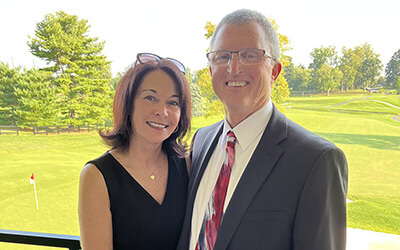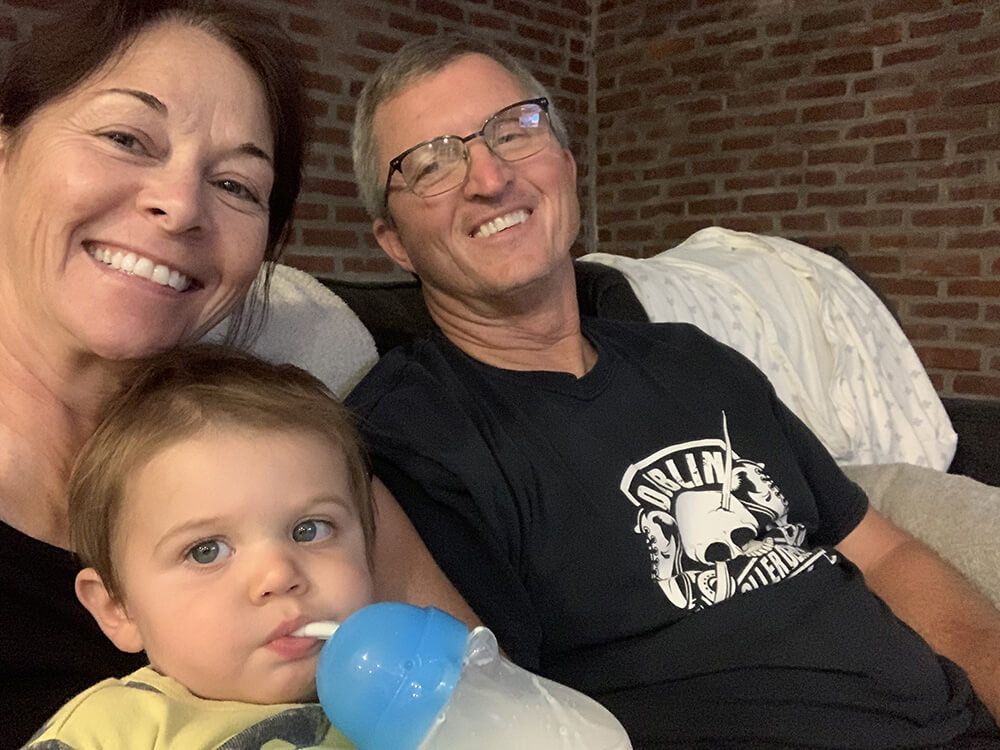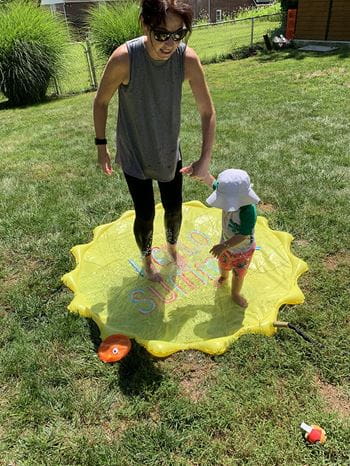Deirdre’s journey through our Post-COVID Recovery Program

Deirdre Ehinger had always lived a high-energy life — up at 4:30 am every day to work out at the gym. And she'd get to the office by 7:30 am to manage her fast-paced career as a meeting planner. Even when the pandemic kept everyone home, Deirdre — a cancer survivor and certified Pilates instructor — participated in daily workouts with her colleagues via Zoom.
When she and several of her family members contracted COVID-19 in November 2020, Deirdre was asymptomatic.
Health changes after having COVID
It was in January 2021 that she began noticing changes in her health. Colleagues commented that she was easily losing her breath, and her husband noticed the same after her regular runs. The wife and mother of two grown sons had just turned 55, and she laughed it off as a sign of getting older. She was also experiencing frequent headaches, and a nagging pain in the back of one of her legs, but thought she might just be spending too much time sitting at her desk.
It was that March, following a trip to Costco in preparation for her daughter-in-law's baby shower, that Deirdre's younger son Danny found her laying exhausted inside the house — her car door left wide open and the car not yet unloaded. Danny helped his mother upstairs to bed.
"When my husband Tony came home that evening, he took one look at me and said, 'What's wrong,'" recalls Deirdre. "I told him, 'I need to go to the hospital.' I went into my office to grab a few things. He found me in there on the floor."
Admitted to the hospital
Deirdre spent much of the next five weeks in the hospital, including three weeks in the intensive care unit. Her medical concerns ranged from a massive gastrointestinal bleed — likely the result of too many over-the-counter pain killers to ease her headaches and leg pain — to acute respiratory failure. Her symptoms were catastrophic.
"One night, my blood pressure was particularly low, and I could feel I was about to crash," says Deirdre. "I said to the nurse, 'I'm going to be a grandmother soon. Please don't let them intubate me.' The nurse responded, 'I don't even know how you're talking to me right now.' They placed me on a high-flow oxygenator. It felt like I was sitting on the wing of an airplane."
There were endless visits by pulmonologists, cardiologists, rheumatologists, infectious disease specialists, hematologists and more, all trying to determine the root cause of Deirdre's illness and how to treat her. Despite multiple tests and numerous scans, there were no clear answers. Her medical team administered high doses of prednisone to get her lungs working again, and Deirdre was finally able to come home three days before her grandson Anthony was born on April 23, 2021.
In the months that followed, Deirdre's medical concerns intensified. She'd lose her balance easily. Her gait was unsteady. She had an irregular heartbeat. She could only hold her new grandson if she was seated.
Chalking it up to deconditioning after a nearly five-week hospital stay, Deirdre continued to receive outpatient therapy and attempted to return to work in September. By December, her memory was worsening substantially, and she was struggling to converse. The defining moment came during what should be a simple task — stacking Tupperware out of the dishwasher. She couldn't discern how the lids fit. Deirdre called her primary care physician, Maria DeMario, DO, in utter despair.
"Deirdre has been my patient for a very long time," says Dr. DeMario. "She's an extraordinary individual — intelligent, articulate, extremely charismatic, with an amazing amount of fortitude, like the Energizer Bunny. And here she was, ravaged in every type of way, including her personality. The life she had was drained out of her. And she was really scared."
Coming to a long COVID diagnosis
At that point in time, there was little awareness about what is now commonly known as long COVID or long-haul COVID — a wide range of ongoing health concerns that can last weeks, months or more following a COVID infection. This was a new frontier. But with no other answers, Dr. DeMario urged Deirdre to seek an evaluation at the Post-COVID Recovery Program at Bryn Mawr Rehab Hospital in Malvern, part of Main Line Health.
"I called and I heard this voice — it was Jeanie Sherriff (BSN, RN, Outpatient Care Coordinator at Main Line Health)," says Deirdre. "I told her, 'I think I'm losing my mind.' Before I shared anything more, she began asking me questions like, do you have trouble placing lids on containers? I started to cry. She understood when no one else did. She made an appointment for me with Dr. Maneyapanda."
Mithra B. Maneyapanda, MD, medical director of the Brain Injury Program at Bryn Mawr Rehab, plays an integral role in the Post-COVID Recovery Program. He conducted Deirdre's initial evaluation.
"Many patients come to us after undergoing extensive medical evaluations by multiple specialists that have been unrevealing," says Dr. Maneyapanda. "Long-haulers can experience very complex symptoms. During my appointment with Deirdre, it became clear she was a candidate. Our program is unique in that it's therapy-based, and focuses on optimizing each patient's functioning and quality of life. Patients with cognitive symptoms may be referred to speech-language pathology for therapy. For patients with fatigue and decreased physical endurance, a structured exercise program through physical therapy may be recommended. Most patients we see require multiple services."
Post-COVID Recovery Program
The Post-COVID Recovery Program at Bryn Mawr Rehab features a multidisciplinary approach, comprising an experienced team of physiatrists, neuropsychologists, psychologists, physical therapists, occupational therapists, speech-language pathologists and case managers who work together. Depending upon individual patient needs, referrals are also made to experts in cardiology, pulmonology, dermatology, gastroenterology and infectious disease, among other specialties.
For Deirdre, beginning her therapy as a participant in the Long-COVID Support Group at Bryn Mawr Rehab, facilitated by clinical psychologist Janet R. Belitsky, PsyD, was monumental.
"Deirdre initially struggled with understanding long COVID symptoms and adjusting to post-COVID life changes," says Dr. Belitsky. "She benefited greatly from long COVID education, validation, empathy, a sense of universality and coping strategies our group provided."
"Long COVID is such a tapestry of syndromes, and for patients like Deirdre, it's all encompassing," adds Dr. DeMario. "In joining the support group, Deirdre finally knew she wasn't alone. There were others like her. And while the road would be long, she knew then there was hope. Bryn Mawr Rehab gave her hope."
Deidre's cognitive evaluation was conducted by neuropsychologist Kami Marchese, PsyD, whose role in the program is to assess the direct and indirect effects of COVID on an individual's cognitive performance and, by extension, their overall functioning. Dr. Marchese's comprehensive approach includes a one-on-one interview, administration of a battery of tests and a review of each patient's medical journey. She then uses this information to create a report outlining each patient's unique strengths and weaknesses, which enables team members to tailor a highly individualized treatment plan.
Deirdre's road to recovery
For Deirdre, treatment would involve physical therapy, occupational therapy and speech therapy. She would spend the next six months participating in intensive therapy sessions across all three disciplines, twice a week at Bryn Mawr Rehab, followed by hours upon hours of homework. Deirdre never missed an appointment, and her husband attended every single session, always serving as her biggest cheerleader.
Her team — physical therapist Deborah Watson-Shaeffer, PT, MSPT; occupational therapist Gabrielle Murray, OTR/L and speech therapist Kristen Seiz Huntington, MA, CCC-SLP — worked together to coordinate her care.
Deirdre's physical therapy sessions focused on improving balance, aerobic capacity, functional endurance, strength and coordination, among other issues.

Within six weeks, Deirdre went from not being able to step over one cone to stepping over 20 cones. It was in that moment she realized the program was going to work.
Occupational therapy sessions were geared toward reaching Deirdre's functional goals — doing laundry, cooking for her family, caring for her grandson and more.
Murray introduced a wide range of activities designed to improve cardiovascular endurance, core and upper body strength, balance, functional cognition and vision. Examples included utilizing the treadmill while performing oculomotor activities such as visual mazes, reaction-based activities that incorporated multiple distractions, building grip strength through simulated household chores and performing rapid-fire, three-dimensional tracking while simultaneously recalling ingredients required for common meal preparation.
In her speech therapy sessions, Deirdre worked diligently to overcome the cognitive communication challenges that were impacting her ability to return to work and function well in daily life. These areas included auditory comprehension, processing, focus for task completion, high-level attention, memory, word retrieval and thought organization. Functional activities assigned by Seiz Huntington that incorporated these skillsets included creating mock meeting planning events and delivering presentations. As Deirdre's functional skills improved, her confidence flourished.
"The commitment Kristen, Deb and Gabbey put into finding the right path for me was phenomenal," says Deirdre. "They knew exactly when to push me and when to pull back. On any given day, one of them would say to me something like, 'last night, I was doing some additional research, and I think this will work for you.' That they were taking their own time to do research about what might help me just blew my mind. For every patient at Bryn Mawr Rehab, these therapists come in every day with the objective to make your life better, and they do so with extraordinary passion. Even the receptionist at the front desk would comment, 'Deirdre, you're walking so much better!' It's a miracle place. I knew I was home there because everyone was rooting for me. They were invested in my care like I was family."
Getting back to living her life
And with that care, Deirdre's progress was remarkable by every measurement. In her Patient-Specific Functional Scale for physical therapy, Deirdre progressed from 38% at her initial evaluation to 96% at discharge. Her cognitive communication skills on her Patient-Specific Functional Scale for speech therapy increased from 40% to 90%.
"Deirdre's final day of therapy was bittersweet," says Murray. "We were so proud of how far she'd come and amazed at how much her confidence had improved. Prior to COVID, Deirdre was a very strong and independent woman. She was a devoted wife, mother and grandmother, a successful businesswoman, an avid runner and so much more. After COVID, she felt as though she had lost every aspect of her life. She was deeply worried about being able to return to some sense of normalcy. Deirdre put so much hard work and dedication into every aspect of her rehabilitation. And she did it!"
"My therapy team was giving me so much of themselves. It would have been disrespectful of me to not to give them back everything I have in return," says Deirdre. "When I blew out my six-minute walk test — a test I couldn't perform at all in the beginning, because my oxygen level would drop to a dangerous level, Deb was standing in the hallway cheering with her arms raised high up in the air."

Deirdre visits with her cardiologist and pulmonary specialists just once a year now. She takes several medications, including one for a clotting auto-immune disorder. She admits there are days when she still gets frustrated with herself, for example, using fine motor skills such as picking up an earring. But seeing her grandson gives her all the strength she needs to keep trying. She says unless you knew her story, you could never tell all that she's been through.
"While I still have some cognitive limitations, Bryn Mawr Rehab taught me strategies to work around that," says Deirdre. "These days, I walk for two miles with my dogs every morning. I'm able to lean over Anthony's crib to put him down without losing my balance. I went to a wedding. And I danced! I'm living proof the Post-COVID Recovery Program works. I have so much gratitude. Bryn Mawr Rehab gave me back my life."
Next steps:
Learn more about the Post-COVID Recovery Program at Bryn Mawr Rehab Hospital
Treating long-haul COVID patients one unique symptom at a time at Bryn Mawr Rehab